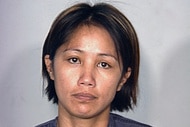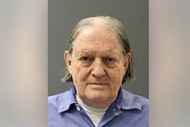Create a free profile to get unlimited access to exclusive videos, breaking news, sweepstakes, and more!
Parents Die After Argument With Rebellious Alabama Teen, But Who Pulled The Trigger?
Less than 15 minutes after a deputy left the home of former mayor Michael Holton, gunshots went off, killing both Michael and his estranged wife, April, in 2016.
It took just 11 minutes.
When Elmore County Sheriff’s deputy left the home of Michael Holton at 4:48 p.m. on Sept. 11, 2016, it seemed as if a family crisis was subsiding.
But just 11 minutes later, one person was dead and another lay dying, according to "Dateline: Secrets Uncovered," airing Wednesdays at 8/7c on Oxygen.
Michael Holton and his estranged wife, April, were found on the bedroom floor of the home suffering from what would ultimately be fatal gunshot wounds, but was it a murder-suicide by a man distressed by his crumbling marriage or had the couple’s rebellious 17-year-old old son Jesse Madison Holton — known as Madison — pulled the trigger in a fit of rage, killing both his parents?
Madison’s parents had reached a breaking point earlier that day after Michael Holton, the former mayor and fire chief of the small town of Eclectic, Alabama, had gotten a call from a concerned parent about a drug-filled party going on at his home while he was at work, according to “Dateline: Secrets Uncovered.” It was the final straw for both Michael and April, who were separated at the time and trying to navigate parenting the rebellious teen amidst their break up.
They called the Elmore County Sheriff’s Office and a deputy arrived to find Michael had placed his son in handcuffs.
“Mr. Holton actually greeted him in the yard and told him, ‘Hey, when you come in, you’re going to see my son is handcuffed’ and he said ‘I’m trying to discipline my son,'" Elmore County Sheriff Bill Franklin told “Dateline” reporter Josh Mankiewicz. “I don’t think his intent was to harm or hurt the kid. He was merely trying to see what he could do to get his attention.”
Frustrated, Michael asked the deputy how they could get the courts involved.
“They had pretty much reached their wits end,” Franklin said.
The deputy left the house after giving Michael and April instructions about how to get a copy of the police report, but just 11 minutes later they received a 911 call after gunshots were fired.
April — who had suffered gunshot wounds through her hand as if she had tried to defend herself from the attack as well as to her head — was struggling for her life but later died at a local hospital. Michael, who died at the scene, had one gunshot wound to the head.
Madison told authorities that after the deputy left, his parents went into a bedroom to talk and began to argue. They got into a physical fight and Madison fled the house to get help from a nearby neighbor, who called 911.
Investigators initially believed it looked like a murder-suicide but after the state pathologist determined Michael had been shot in the back of the head, the death was classified as a homicide.
“I’ve been in law enforcement for 39 years. I’ve never seen somebody try to commit suicide in such a weird, unique manner,” Franklin said of the gunshot wound’s location.
Investigators also believed Michael would have had to fire the weapon with his left-hand, even though he was right-handed.
They turned their attention to the only other person who had been in the house that afternoon, the couple’s son Madison. They were troubled by his attitude about the deaths.
“He seemed more concerned about missing homecoming, school and things of that nature,” Franklin said.
In a call recorded from jail a few days after he’d been arrested, Madison asked someone what “all the girls said about” his arrest.
“Like, the people I slept with, like, what do they think about it right now?” he asked in the call. “Like, Oh, damn. I [expletive] a murderer.”
Yet Madison insisted that he hadn’t killed his parents and told investigators that he heard his mom scream “help” about five minutes after his parents had gone behind the closed bedroom door.
After hearing her call, he said that he jumped up, kicked the door open, and saw his dad with his mom in a headlock before he went screaming to the neighbors to get help.
Madison told “Dateline: Secrets Uncovered” he had asked for a polygraph test “like three or four times” to prove his innocence — a request that was also captured on interrogation video — but he was never given one.
And then there was something else. When the deputy left the home, Madison had been handcuffed with his hands behind his back. His hands were in the handcuffs when authorities returned. Investigators believed he took the handcuffs off using a key found in the living room to carry out the murders, but others in the community, including his twin uncles — who each had a background in law enforcement — supported Madison.
“He didn’t do it,” his uncle Mike Owenby said. “It’s not possible.”
The teenager also didn’t have any DNA or blood on his clothes.
Madison, who had been living with his dad after his parents separated, also recalled how distraught his dad had been when he found out that April — his one-time high school sweetheart — had moved on with a new boyfriend.
“He like freaked out and then he called her and was like going off on her about it,” he told “Dateline.” “It was like, ‘I need you. I can’t live without you,’ stuff like that and whenever we got back home, I had never seen my dad cry before, but he was bawling.”
In a journal found in his home, Michael documented the distress himself, writing in a letter to April, “I just can’t go on knowing that you are with somebody else” and “it was either me or the both of us.”
Madison’s uncle Chris Owenby believed on the day of the shooting, Michael “snapped” and killed his wife before shooting himself.
“I think Michael couldn’t face the world knowing that he killed his wife and the only option left for him was to end his own life,” Chris said.
Investigators found Michael’s DNA under April’s fingernails and Michael had scrapes on his face, suggesting a possible struggle. Michael had also been under the influence of hydrocodone, oxycodone and tramadol at the time of the murder.
Authorities remained convinced that Madison had been the one to pull the trigger, but just as the trial was set to begin the district attorney announced that they did not have enough proof beyond a reasonable doubt to pursue the case. The pathologist who had once ruled Michael’s death a homicide was not prepared to testify that he was 100 percent sure of that determination under oath.
The murder charges were ultimately dismissed, although the state can later decide to refile the charges in the future if more evidence develops.
“From everything that I’ve been through I have no doubt in my mind that the sheriff will try to put me back in jail,” Madison said, telling Mankiewicz he’s considering one day becoming a defense attorney to help others like himself.
For more on this case and others like it, watch "Dateline: Secrets Uncovered," airing Wednesdays at 8/7c on Oxygen or stream episodes here.

































